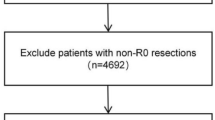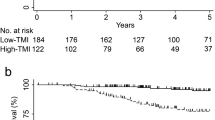Abstract
Background
Prognostic information regarding the risk of postoperative tumor recurrence defined by a profile of serological, morphological and/or molecular markers can have potential value, particularly for patients with colorectal carcinoma (CRC) of the International Union Against Cancer (UICC) stage II/III who may benefit from adjuvant chemotherapy after surgery.
Methods
A retrospective study of 783 patients with CRC (UICC I–III) including a subgroup analysis of 116 subjects was conducted to determine preoperative serum carcinoembryonic antigen (CEA), carbohydrate antigen (CA) 19-9, and p53 serum levels. In addition, protein and gene expression of p53, CEA, and adenomatous polyposis coli (APC) was assessed in the tumors of those patients. The values of all serological, morphological, and molecular parameters were correlated with clinicopathological characteristics for their predictive value of tumor recurrence over a mean follow-up period of 32 ± 6.2 months.
Results
Serum CEA but not CA 19-9 or p53 was a significant prognostic factor for disease-free survival, along with UICC and T/N stage. When comparing elevated CEA, CA 19-9, and p53 serum levels with expression of the markers in the tumors, their overall expression was found to be 61.3% in the serum versus 93.5% in the tumor in analyzed patients (n = 116). In particular, all patients in UICC stages I–III who demonstrated at least three elevated markers (CEA/CA 19-9/p53) in serum and/or in the tumor presented with tumor recurrence/metastases.
Conclusion
Overall increased p53, CEA, and CA 19-9 serum levels and their marker expression in the tumor may be used at the time of primary tumor removal for defining patients at risk for tumor recurrence.



Similar content being viewed by others
References
Wiggers T, Arends JW, Schutte B, et al. A multivariate analysis of pathologic prognostic indicators in large bowel cancer. Cancer 1988; 61(2):386–95
Hollstein M, Sidransky D, Vogelstein B, Harris CC. p53 mutations in human cancers. Science 1991; 253(5015):49–53
Allegra CJ, Paik S, Colangelo LH, et al. Prognostic value of thymidylate synthase, Ki-67, and p53 in patients with Dukes’ B and C colon cancer: a National Cancer Institute-National Surgical Adjuvant Breast and Bowel Project collaborative study. J Clin Oncol 2003; 21(2):241–50
Yamamura T, Matsuzaki H, Suda T, et al. Clinicopathological variables and p53 overexpression as a combined prognosticator for hematogenic recurrence in colorectal cancer. J Surg Oncol 1999; 70(1):1–5
Diez M, Pollan M, Muguerza JM, et al. Time-dependency of the prognostic effect of carcinoembryonic antigen and p53 protein in colorectal adenocarcinoma. Cancer 2000; 88(1):35–41
Caldes T, Iniesta P, Vega FJ, et al. Comparative survival analysis of p53 gene mutations and protein accumulation in colorectal cancer. Oncology 1998; 55(3):249–57
Okubo R, Masuda H, Nemoto N. p53 mutation found to be a significant prognostic indicator in distal colorectal cancer. Oncol Rep 2001; 8(3):509–14
Hsieh JS, Lin SR, Chang MY, et al. APC, K-ras, and p53 gene mutations in colorectal cancer patients: correlation to clinicopathologic features and postoperative surveillance. Am Surg 2005; 71(4):336–43
Soussi T. p53 Antibodies in the sera of patients with various types of cancer: a review. Cancer Res 2000; 60:1777–88
Zalcman G, Tredaniel J, Schlichtholz B, et al. Prognostic significance of serum p53 antibodies in patients with limited-stage small cell lung cancer. Int J Cancer 2000; 89: 81–6
Hamelin R, Laurent-Puig P, Olschwang S, et al. Association of p53 mutations with short survival in colorectal cancer. Gastroenterology 1994; 106(1):42–8
Watanabe T, Wu TT, Catalano PJ, et al. Molecular predictors of survival after adjuvant chemotherapy for colon cancer. N Engl J Med 2001; 344(16):1196–206
Shim KS, Kim KH, Park BW, et al. Increased serum levels of mutant p53 proteins in patients with colorectal cancer. J Korean Med Sci 1998; 13(1):44–8
Adrover E, Maestro ML, Sanz-Casla MT, et al. Expression of high p53 levels in colorectal cancer: a favourable prognostic factor. Br J Cancer 1999; 81(1):122–6
Goldstein MJ, Mitchell EP. Carcinoembryonic antigen in the staging and follow-up of patients with colorectal cancer. Cancer Invest 2005; 23(4):338–51
Wittekind Ch, Meyer HJ, Bootz F. TNM Klassification maligner Tumoren. Sixth Edition. Berlin, New York: Springer Verlag, 2002
Westra JL, Plukker JT, Buys CH, Hofstra RM. Genetic alterations in locally advanced stage II/III colon cancer: a search for prognostic markers. Clin Colorectal Cancer 2004; 4(4):252–9
Wang WS, Lin JK, Chiou TJ, et al. CA19-9 as the most significant prognostic indicator of metastatic colorectal cancer. Hepatogastroenterology 2002; 49(43):160–4
Wanebo HJ, Rao B, Pinsky CM, et al. Preoperative carcinoembryonic antigen level as a prognostic indicator in colorectal cancer. N Engl J Med 1978; 299(9):448–51
Chu DZ, Erickson CA, Russell MP, et al. Prognostic significance of carcinoembryonic antigen in colorectal carcinoma. Serum levels before and after resection and before recurrence. Arch Surg 1991; 126(3):314–6
Wolmark N, Fisher B, Wieand HS, et al. The prognostic significance of preoperative carcinoembryonic antigen levels in colorectal cancer. Results from NSABP (National Surgical Adjuvant Breast and Bowel Project) clinical trials. Ann Surg 1984; 199(4):375–82
Carriquiry LA, Pineyro A. Should carcinoembryonic antigen be used in the management of patients with colorectal cancer? Dis Colon Rectum 1999; 42(7):921–9
Behbehani AI, Al-Sayer H, Farghaly M, et al. Prognostic significance of CEA and CA 19-9 in colorectal cancer in Kuwait. Int J Biol Markers 2000; 15(1):51–5
Turoldo A, Balani A, Scaramucci M, et al. [Prognostic importance of preoperative CEA in patients with colorectal cancer]. Chir Ital 2002; 54(4):469–76
Goslin R, Steele G Jr., Macintyre J, et al. The use of preoperative plasma CEA levels for the Stratification of patients after curative resection of colorectal cancers. Ann Surg 1980; 192(6):747–51
Lewi H, Blumgart LH, Carter DC, et al. Pre-operative carcino-embryonic antigen and survival in patients with colorectal cancer. Br J Surg 1984; 71(3):206–8
Allende T, Garcia Muniz JL, Vizoso F, et al. [Preoperative serum levels of the carcinoembryonic antigen (CEA) and prognosis in colorectal cancer]. Rev Esp Med Nucl 2001; 20(5):358–64
Steele G Jr., Ellenberg S, Ramming K, et al. CEA monitoring among patients in multi-institutional adjuvant G.I. therapy protocols. Ann Surg 1982; 196(2):162–9
Wang WS, Lin JK, Chiou TJ, et al. Preoperative carcinoembryonic antigen level as an independent prognostic factor in colorectal cancer: Taiwan experience. Jpn J Clin Oncol 2000; 30(1):12–6
Moertel CG, O’Fallon JR, Go VL, et al. The preoperative carcinoembryonic antigen test in the diagnosis, staging, and prognosis of colorectal cancer. Cancer 1986; 58(3):603–10
Staab HJ, Anderer FA, Brummendorf T, et al. Prognostic value of preoperative serum CEA level compared to clinical staging. I. Colorectal carcinoma. Br J Cancer 1981; 44(5):652–62
Chen CC, Yang SH, Lin JK, et al. Is it reasonable to add preoperative serum level of CEA and CA19-9 to staging for colorectal cancer? J Surg Res 2005; 124(2):169–74
Lindmark G, Bergstrom R, Pahlman L, Glimelius B. The association of preoperative serum tumour markers with Dukes’ stage and survival in colorectal cancer. Br J Cancer 1995; 71(5):1090–4
Carpelan-Holmstrom M, Haglund C, Lundin J, et al. Pre-operative serum levels of CA 242 and CEA predict outcome in colorectal cancer. Eur J Cancer 1996; 32A(7):1156–61
Forones NM, Tanaka M. CEA and CA 19-9 as prognostic indexes in colorectal cancer. Hepatogastroenterology 1999; 46(26):905–8
Reiter W, Stieber P, Reuter C, et al. Multivariate analysis of the prognostic value of CEA and CA 19-9 serum levels in colorectal cancer. Anticancer Res 2000; 20(6D):5195–8
Young Tabusso F, Payet Meza E, Celis Zapata J, et al. [Value of the preoperative carcinoembryonic antigen as an independent prognostic factor in cancer of the colon and rectum]. Rev Gastroenterol Peru 2002; 22(3):213–20
Goh HS, Yao J, Smith DR. p53 point mutation and survival in colorectal cancer patients. Cancer Res 1995; 55(22):5217–21
Yamaguchi A, Kurosaka Y, Fushida S, et al. Expression of p53 protein in colorectal cancer and its relationship to short-term prognosis. Cancer 1992; 70(12):2778–84
Acknowledgments
This work is supported by The Deutsche Bundesstiftung Umwelt (DBU, 16011). The authors thank Mrs. Ulrike Faber and Mrs. Helene Greb for their assistance in the preparation of this manuscript and Mrs. Andrea Trumpfheller, Mrs. Sabine Mueller, and Mrs. Mariola Dragan for their technical support.
Author information
Authors and Affiliations
Corresponding author
Additional information
Martin Gasser and Christiane Gerstlauer are Co-first authors
Rights and permissions
About this article
Cite this article
Gasser, M., Gerstlauer, C., Grimm, M. et al. Comparative Analysis of Predictive Biomarkers for Therapeutical Strategies in Colorectal Cancer. Ann Surg Oncol 14, 1272–1284 (2007). https://doi.org/10.1245/s10434-006-9155-0
Received:
Revised:
Accepted:
Published:
Issue Date:
DOI: https://doi.org/10.1245/s10434-006-9155-0




